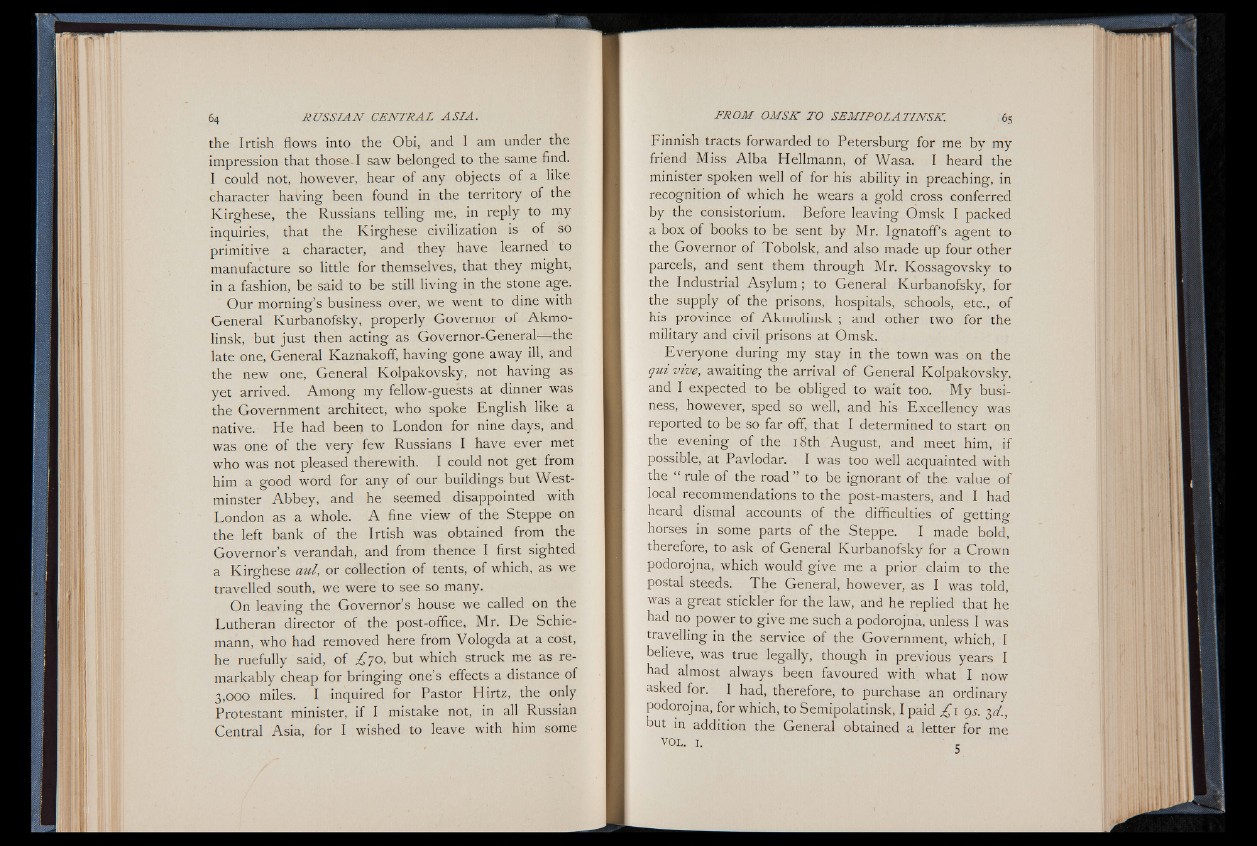
the Irtish flows into the Obi, and I am under the
impression that those-1 saw belonged to the same find.
I could not, however, hear of any objects o f a like
character having been found in the territory of the
Kirghese, the Russians telling me, in reply to my
inquiries, that the Kirghese civilization is of so
primitive a character, and they have learned to
manufacture so little for themselves, that they might,
in a fashion, be said to be still living in the stone age.
Our morning’s business over, we went to dine with
General Kurbanofsky, properly Governor of Akmo-
linsk, but just then acting as Governor-General— the
late one, General Kaznakoff, having gone away ill, and
the new one, General Kolpakovsky, not having as
yet arrived. Among my fellow-guests at dinner was
the Government architect, who spoke English like a
native. He had been to London for nine days, and
was one of the very few Russians I have ever met
who was not pleased therewith. I could not get from
him a good word for any of our buildings but Westminster
Abbey, and he seemed disappointed with
London as a whole. A fine view of the Steppe on
the left bank of the Irtish was obtained from the
Governor’s verandah, and from thence I first sighted
a Kirghese a,ul, or collection of tents, of which, as we
travelled south, we were to see so many.
On leaving the Governor’s house we called on the
Lutheran director of the post-office, Mr. De Schie-
mann, who had removed here from Vologda at a cost,
he ruefully said, of £ 70 , but which struck me as remarkably
cheap for bringing one’s effects a distance of
3,000 miles. I inquired for Pastor Hirtz, the only
Protestant minister, if I mistake not, in all Russian
Central Asia, for I wished to leave with him some
Linnish tracts forwarded to Petersburg for me by my
friend Miss Alba Hellmann, of Wasa. I heard the
minister spoken well of for his ability in preaching, in
recognition of which he wears a gold cross conferred
by the consistorium. Before leaving Omsk I packed
a box of books to be sent by Mr. Ignatoff’s agent to
the Governor of Tobolsk, and also made up four other
parcels, and sent them through Mr. Kossagovsky to
the Industrial Asylum ; to General Kurbanofsky, for
the supply of the prisons, hospitals, schools, etc., of
his province of Akmolinsk ; and other two for the
military and civil prisons at Omsk.
Everyone during my stay in the town was on the
qui vive, awaiting the arrival of General Kolpakovsky,
and I expected to be obliged to wait too. My business,
however, sped so well, and his Excellency was
reported to be so far off, that I determined to start on
the evening o f the 18th August, and meet him, if
possible, at Pavlodar. I was too well acquainted with
the “ rule of the road ” to be ignorant of the value of
local recommendations to the post-masters, and I had
heard dismal accounts of the difficulties of getting
horses in some parts of the Steppe. I made bold,
therefore, to ask of General Kurbanofsky for a Crown
podorojna, which would give me a prior claim to the
postal steeds. The General, however, as I was told,
was a great stickler for the law, and he replied that he
had no power to give me such a podorojna, unless I was
travelling in the service of the Government, which, I
believe, was true legally, though in previous years I
had almost always been favoured with what I now
asked for. I had, therefore, to purchase an ordinary
podorojna, for which, to Semipolatinsk, I paid £ 1 gs. 3d.,
but in addition the General obtained a letter for me
v o l . 1. s